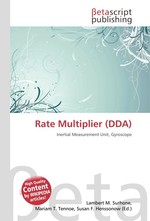

Ожидаемое поступление (если вы сделаете заказ прямо сейчас): 17.02.2026; планируемая отправка: 18.02.2026
Ожидаемое поступление (если вы сделаете заказ прямо сейчас): 22.02.2026; планируемая отправка: 23.02.2026
Технические характеристики
Please note that the content of this book primarily consists of articles available from Wikipedia or other free sources online. A Digital Differential Analyzer (DDA), also sometimes called a Digital Integrating Computer, is a digital implementation of a Differential Analyzer. The integrators in a DDA are implemented as accumulators, with the numeric result converted back to a pulse rate by the overflow of the accumulator. The primary advantages of a DDA over the conventional analog Differential Analyzer are greater precision of the results and the lack of drift/noise/slip/lash in the calculations. The precision is only limited by register size and the resulting accumulated rounding/truncation errors of repeated addition. Digital electronics inherently lacks the temperature sensitive drift and noise level issues of analog electronics and the slippage and "lash" issues of mechanical analog systems.